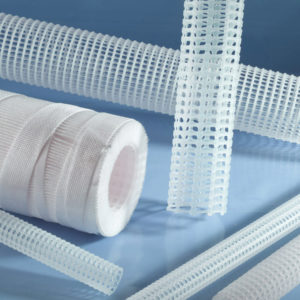
Automotive Protection & Reinforcement Nets
TENAX products go into a number of different automotive component applications. For example, light weight netting is used as support and reinforcement of industrial foams and textiles inside car seats, doors, dashboard and as a reinforcement layer for carpets.
HPP – Homopolymer polypropylene
A Light material, resistant to chemical substances (as salts, acids and strong alkalis) and with a high mechanical strength. It is used for bi-oriented (stretched) products. Suitable for direct food contact.
Specific weight: 0.9-0.915 g/cm3 (56.19-57.12 lb/ft3)
Melting temperature: 162-168°C (323.6-334.4°F)
Tensile strength: 34-37 MPa
Young’s modulus: 1200-2000 Pa
Yield elongation: 5-10%
Break elongation: 500-700%
Working temperature: +0°C – +90°C (32°F – 194°F)
Max working temperature (short period): +100°C (212°F)
CPP – copolymer polypropylene
Slightly softer and more resistant to high temperature than the homopolymer and with similar mechanical features. Suitable for direct food contact.
Specific weight: 0.895-0.9 g/cm3 (54.62-56.19 lb/ft3)
Melting temperature: 135-168°C (275-334.4°F)
Tensile strength: 25-30 MPa
Young’s modulus: 1000 Pa
Yield elongation: 5-10%
Break elongation: >500%
Working temperature: -20°C – 70°C (68°F – 158°F)
Max working temperature (short period): +80°C (176°F)
PA6 (Nylon) -Polyamide 6
It is an advanced polymer able to stand high temperatures and direct contact with oil, grease, fuel and other solvents. It shows a low friction coefficient and is resistant to abrasion, shocks and fatigue.
Specific weight: 1.12-1.14 g/cm3 (69.91-71.16 lb/ft3)
Melting temperature: 220-225°C (428-437°F)
Tensile strength: 80 MPa (dry) –55 MPa (wet)
Break elongation: 20-40% (dry) – 100% (wet)
Working temperature: -40°C – 105°C (-40 – 221°F)
Max working temperature (short period): 170°C (338°F)























Be the first to review “Automotive Protection & Reinforcement Nets”
You must be logged in to post a review.